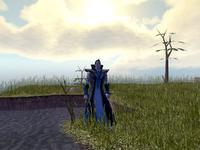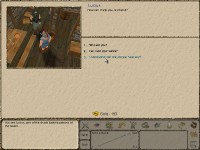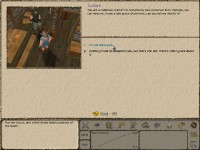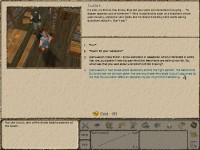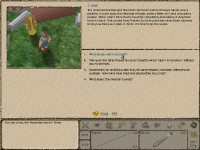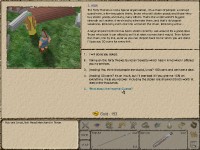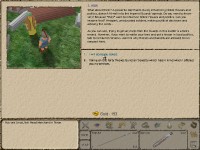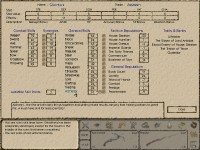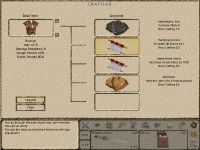|
The Age of Decadence - An Interview
Brian 'Dhruin' Turner, 2006-06-02 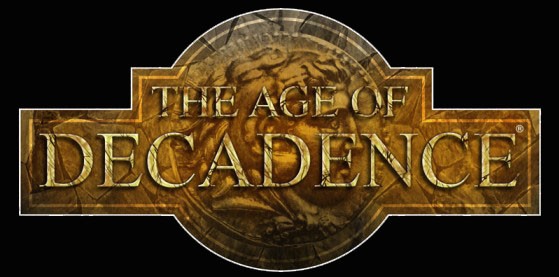
There really aren't too many RPGs that offer players genuine choices in the gameplay - let alone ones that are designed with a complete diplomatic path. If you've ever complained about the lack of depth in modern cRPGs or just enjoy a form of gameplay that has passed out of favour - isometric, turn-based and dialogue heavy - read on to find out about one of the most promising developments in many a year.
RPGDot: Please introduce yourself and tell us about the development team.
Iron Tower: I'm the lead designer of the game. We have a small 4-people core team: designer, programmer, modeller, and animator, plus 4 people who did concept art, items art, interface, website, etc.
RPGDot: Can you give us a summary of Age of Decadence and the gameplay it will offer? What are your high-level design goals?
Iron Tower: From our brand-new website:
"The Age of Decadence is an isometric, turn-based, single-player 3D role-playing game set in a low magic, post-apocalyptic fantasy world, inspired by the fall of the Roman Empire. The game features a detailed skill-based character system, non-linear gameplay, multiple skill-based ways to handle quests, choices & consequences, and extensive dialogue trees."
The gameplay & my "high-level design goals" revolve around making very different, logically fitting choices and seeing very different, logical consequences. Action - Reaction. There are seven factions with different agendas, operations, allies & enemies. It's impossible to do something that won't affect a lot of people.
Each quest has 3-6 different ways of solving it. That should encourage players to approach quests more carefully, consider pros & cons of different choices available to them, and pick what fits your character the most.
RPGDot: Describe the setting, background story and relevance of the title.
Iron Tower: The setting is post-apocalyptic fantasy. Several hundred years ago a war between two kingdoms almost destroyed them both. Magic, not unlike nuclear power, was used and supernatural allies were summoned. Needless to say, what's left wasn't in any shape to be called empires or kingdoms, so the age of town-states and decadence has begun. A lot of knowledge has been lost; magic was blamed for the devastation, and was all but banned; facilities that were seemed too dangerous were sealed.
The story begins when your character acquires an ancient map. Learning where and what the map leads to, dealing with factions that have very different goals, and finally dealing with what awaits for you at the end of your journey is what the game is all about.
RPGDot: Looking at the screens we've seen, there's an obvious Roman theme. Why did you decide on this aesthetic and how pervasive are these themes throughout the game (not just visually)?
Iron Tower: Well, I think it's safe to say that medieval settings and vanilla fantasy have been done to death. I wanted to make something different. Since I was also exploring some post-apocalyptic / fallen empire concepts, the fall of the Roman Empire as a great reference material made a Roman-inspired setting an easy choice.
RPGDot: What does "low-magic" really mean and why is this a good thing for the actual gameplay?
Iron Tower: Low magic means that there are some magical elements (in other words, it's not a realistic setting), but they don't play a large role in the game or in the setting. The world has been scorched by the reckless and desperate use of magic during the war. Now magic is associated with the devastation; and the few remaining mages are being held on a very short leash and their teachings are restricted to a very few apprentices.
As for whether or not it's a good thing, I don't think it could be defined in such absolute terms. To put it simply, in the world that we've designed, there was no logical place for everyone and their dogs running around and castings spells.
RPGDot: I believe the gameworld world is structured something like Fallout with individual maps and an overland travel map - is this correct? How many major locations are there and what sort of different environments will players encounter?
Iron Tower: It's correct. The setting is post-apocalyptic, so some areas are desolated, and some areas aren't. Overall, we have 22 locations to explore, including towns, outposts, digs, ruins, camps, sealed towers, forgotten and buried facilities, and so on.
RPGDot: Let's talk about character creation and development. First, AoD uses a skill-based system, although a class is also initially chosen. Can you elaborate on this?
Iron Tower: It's not a class, but a background. It's what you did in the gameworld, before the in-game events. It helps defining your character better, establishing his ties with various factions. For example, a thief starts as a member of the Thieves Guild (joining it on your own is more complicated than walking in and asking for an application form), gets a reputation bonus when dealing with shady elements and factions supporting the Thieves Guild for their own reasons, and a reputation penalty with the Imperial Guards and the Merchants Guild.
The background doesn't restrict your character in any way. A knight may specialize in combat and serve his Noble House in that capacity, or he/she may specialize in diplomacy or stealth. An assassin can rely on a quick blade and Critical Strike skill, or on poison and charms, and so on.
Backgrounds are optional, you don't have to choose one, in which case you will enter the game world as a stranger. Nobody knows you, which could be a good thing or a bad thing; depends on how you look at it.
RPGDot: The skill list we've seen has around 20 skills, from standard fair like one-handed melee and healing to some more unusual ones, which I'd like to discuss. What does Streetwise offer?
Iron Tower: Skills are explained on the site, so don't forget to take a look, but here are some alternative explanations:
Streetwise is a counter-persuasion skill. It's that inner voice that warns you that something doesn't sound right, and that the offer you've just received is just too good to be true.
Etiquette?
It's the art of knowing and successfully applying different codes of behaviour. How do you bribe a lord without insulting him by implying that his goodwill is for sale? What's the perfect balance of showing your respect to a local kingpin without inviting him to walk all over you? That's what Etiquette handles.
Disguise?
It's a rare ability of talking the talk, while walking the walk. It's an art of impersonating and behaving like you are someone else. Don't want to do some "admission" quests to get to see a local lord? Pretend that you are a knight from another House on a diplomatic mission and dare some peasant guards to stop you.
RPGDot: You also have melee specialisation sub-skills - how do these work and why did you decide to do this with melee but not other skills?
Iron Tower: "Subskills" work as long as they stay useful throughout the game and as long as you can use them frequently. Needless to say, it works with combat skills, and it works with dialogues skills (which is why we have 3 different skills instead of a single Diplomacy skill), but splitting other skills would have only created unsupported options and "dead ends"
Going back to the melee subskills, we have skills synergies for those who like to use different weapons. So, basically, if you are good with swords, it shouldn't mean that you don't know how to hold hammers. The highest melee skill gives bonuses to other melee skills. For example, if your sword skill is 80, and your hammer skill is 20, you get 40% of the difference bonus to your hammer skill. In other words, your hammer skill is now 44.
RPGDot: One of your stated goals is to make each skill meaningful. How much effort has been put into this and ultimately, how many skill-related paths are you aiming to offer?
Iron Tower: A lot? Not enough? Hard to say. We've tried to offer as many logical ways of dealing with each situation as possible. So, let's say, if you see a gate, locked at night, guarded during the day, you should be able to open the lock, sneak, steal a key, fight your way in, talk your way in, disguise yourself, climb the wall, find someone who has a pass, and steal it, trade it, or convince this person to give it to you, etc. The trick is to find out who has the pass, where is the key, who is allowed to pass freely, etc, as such info isn't given to you on a platter.
RPGDot: You once argued that - ideally - a diplomatic solution should be available for every quest - are you pursuing that philosophy with AoD?
Iron Tower: Yes, you can beat the game, using nothing but diplomatic skills. If one character can kill everything that opposes him in a gameworld, including entire armies, I see no reason why a diplomatic character can't influence, manipulate, persuade people and play them against each other. Makes way more sense.
RPGDot: Opening vignettes are planned based on the player's class - would you mind describing them? How long are they and how much freedom will players have?
Iron Tower: There is a mini-story, explaining how your character got the map. An independent merchant, seeking trading favors from one of the Noble Houses, controlling a small town, arrives into the town, bringing a gift, an ancient map, to the lord of the town. The Merchants Guild quickly orders the assassination, and the merchant is attacked before he has a chance to meet with the lord and present his gift and his case.
Now, the player picks a "background" when he/she starts the game, which defines his/her position within the gameworld and the role in the vignette mini-story. For example, the mercenary is hired to protect the merchant, the loremaster will be called to identify the map, the assassin is hired to kill the merchant, etc. In the end, one way or another, PC acquires the map, and starts figuring out what to do with it.
There is some degree of freedom in each vignette, but the overall freedom is limited. Obviously, if you are hired to kill the merchant, you can't go exploring far away places for 3 months, and then remember about the merchant. In the actual game, we handle such matters differently; allowing the events you may have changed to take place, but since getting the map is what starts the story, we have to ensure that you get it.
RPGDot: Factions are another major feature. What sort of factions are available and how dynamic are they in terms of factional content such as quests and bonuses as well as impact on the broader gameplay - how widely is factional membership recognised by NPCs, for example? Will aligning with different factions change the course of the game? Are there any obligations that come with membership?
Iron Tower: We have 7 factions: 3 Noble Houses with different agendas, the Imperial Guards, and 3 professional guilds: assassins, thieves, merchants. You can join all of them, if they want you, but your rank and reputation would eventually make progressing in every faction impossible.
Working for different factions will have different consequences, depending on what you do and how you do it. Your membership and rank will be recognized and not in a "hey there, [rank] of [faction]!" way. Some people will deal with you, and some people won't. Some people will make you special offers, reflecting your rank in another faction. Some people will recognize your hard work and efforts by hiring assassins. You never know.
Memberships come with advantages and disadvantages, as all things should. You will be able to ask your faction for help with your quests and tasks. As long as you are in good books, they will help. You will be able to rely on your faction's reputation to open certain doors and deal with certain people, who may disregard you personally, but [godfather reference] not the faction you are with. [/reference]
RPGDot: Dialogue: how important is it and what sort of system have you created? We've seen skill modifiers in screenshots - how widely is this used?
Iron Tower: Considering that you play the entire game without attacking anyone, dialogues are, obviously, important. I didn't create or *cough* redefined any system, as the standard dialogue trees with skill checks do the job extremely well. Stat/skills/reputation/items check are everywhere.
RPGDot: Other factors beyond skills - factions or reputation, for example - are these reflected in dialogue choices? What about meta-roleplaying - choices such as "good" or "evil" paths that aren't tied directly to the character but are open to the player to interpret?
Iron Tower: Factions, reputations, and previously made choices do influence your dialogue options. We also have plenty of moral choices that you can make. The game tracks some choices and your moral traits like loyalty, for example, will affect your gameplay and dialogue choices.
RPGDot: While stat-checks in dialogue reward players for developing certain traits, it can sometimes lead to less interactivity. For example, a high-intelligence character might be given additional dialogue options that provide a direct resolution - but the player has to do little other than pump points into the stat. Do you see this as an issue?
Iron Tower: It depends on the design, doesn't it? Granted, if all you do is pick the best line every time, it is very boring. We don't have simplistic scenarios where you have one "trial point" for all character types, we have more complex situations that require a different gameplay style. For example, you are asked to free a noble kidnapped by a raiders gang. A fighter goes and kills the raiders, which is a rather straightforward approach. A talkative character has a lot more options there. He can negotiate the ransom, and with some trading skills he can even pocket the difference. Alternatively, he can convince a faction (The Thieves Guild won't be too happy about some raiders moving into the Guild's territory, and the Imperial Guards might be convinced to handle that for you too) to help you. Nothing is free though.
RPGDot: Consequences: what is your design philosophy and how does this play out in Age of Decadence?
Iron Tower: If what you do is meaningless, if people don't react to your actions, if you need to imagine consequences or that someone cares, the game is boring, at least, in my opinion.
RPGDot: Can you give us an overview of the combat system?
Iron Tower: It's a turn-based, grid-based action-point system. What that means is that actions are taken in sequential turns; actions are measured in action points, representing speed, and your available actions per turn are determined by the AP cost of each action and your overall AP pool, and your available moves are displayed and determined by a square-based grid, adding a tactical element.
RPGDot: Unlike Fallout, for example, I believe there are no followers - correct? Is there a danger turn-based combat with a single character can lack tactical options? How do you keep combat interesting throughout the game, particularly without magic as an option?
Iron Tower: There are no followers, although sometimes your allies will help you if you ask nicely. You don't control them though. As for keeping combat interesting, there are quite a few things you can do in combat that add depth and tactical elements.
To start with, weapons and armor have different traits, i.e. hammers give you a chance to knock your opponent down (it worked very well in Fallout), spears may help you keeping your opponents at bay, heavy armor makes you easier to hit and slows you down, but absorbs a lot of punishment, while light armor does the opposite, etc. So choosing your equipment is more important than in most RPGs where you go for items with highest values.
Then you have different attacks: fast, regular, power, aimed, and special (i.e. whirlwind, etc). So, if you have 9 AP, and you have a short sword (4AP), you can either attack twice (regular), or power (5AP) and regular attack, or 3 fast attacks, or a power attack and two fast attacks a dagger (2AP) in the other hand. Power attacks work better against heavily armoured opponents, while fast attacks will be more successful against fast, lightly armoured enemies.
Also, you have throwing nets, corrosive acid, greek fire, etc, so there is a number of actions you can choose from each turn.
RPGDot: What sort of enemies will players encounter and how advanced is the AI in combat?
Iron Tower: We have a large variety of the most horrible and wicked monsters you've ever seen in a game - humans. They really are the worst and no ogre or a lizard can hold a candle to them. We have greedy humans, treacherous humans, bloodthirsty humans, evil humans, and even stupid humans. If we have time, we'll add lawyers and publishers.
We do have a few non-human "characters", but they are rare and dangerous, so if you see one, run.
The AI is decent, it reacts to what you do (i.e. if you turn around and run, your opponent will probably throw his sword at you (we have a nice animation for that) or reach for his crossbow; etc), so there shouldn't be many complaints in that area.
RPGDot: Are there any NPC schedules, reactions to player actions or other elements that help create a dynamic world?
Iron Tower: The gameworld is very reactive. Everything you do affects someone or something and has consequences. NPCs play specific roles and functions in the gameworld. For example, one of the thieves' functions is smuggling. That function is connected to other characters and their functions, creating some interesting action-reaction scenarios for players to, well, play with.
If conditions for successful smuggling operations have changed (smugglers are dead or arrested, the shipment hasn't been sent from another location, corruption among guards has been eliminated, etc), the smuggling stops. And now that affects someone else. Some craftsmen who relied on the supply of cheap ore are out of business. The Merchants' Guild becomes stronger, expands its trading operations and influence.
If you manage to weaken a faction significantly, another faction will see an opportunity and move in, again, affecting a lot of things. The bigger the rock, the bigger the ripples.
RPGDot: Can you tell us about equipment and items in the game, such as weapons and armour? Is there anything like a crafting system? What about Alchemy?
Iron Tower: The game offers 8 weapon classes: daggers, swords, axes, hammers, spears, bows, crossbows, and throwing weapons, and 3-4 weapons per class. For example, the sword class includes short sword, sickle sword, curved sword, and great sword. There are 7 different armor & helmet types, 4 shield types, and numerous non-combat items like rope, tools, flasks, ore, variety of civilian clothing for style and impersonating, rings, and so on.
We do have a very detailed crafting system that allows players to make an average item into an artefact worthy of a king. For starters, we have 4 ore types, so you have some iron and skills (working with bronze, for example, takes less knowledge and skills than working with iron or steel), you can craft yourself an iron blade. If you specialize in hammers and find a mithril axe, you can melt the metal, and then forge it into a hammer. The higher the crafting skill is, the higher the damage bonus is. For example, a highly skilled craftsman with 200 points in Crafting can make a much better blade than an average craftsman with 80 points.
On top of that we have "techniques" that could only be taught by someone else. For example, the Balancing crafting technique would increase the speed of a melee weapon, the Fine Edge crafting technique would add a bonus against armour, etc.
The Alchemy system allows players to make a healing salve (there are no magical healing potions in the game), posion, antidote, acid, greek fire, etc. You can use those elements in many creative ways, from melting locks and poisoning someone to making your very own flaming sword.
RPGDot: You originally started development with a 2D engine and switched to 3D using the Torque engine. At the time, some of your fans criticised you for focusing on graphics with this decision. Looking back, did you make the right decision and how did the change benefit the gameplay?
Iron Tower: Time will tell whether or not we've made the right decision. Back then it seemed to me that way too many people were writing the game off because of the "dated" look. The 3D version certainly gets a better reaction and more interest, so no complaints here.
The benefits are mostly on the visual side: locations, character models, animations, etc.
RPGDot: What do you have planned for the user interface, particularly the journal and maps?
Iron Tower: You can see the interface on the screenshots. The journal and the map are still being tweaked, but I believe they fall under the "you've seen one, you've seen 'em all" category. The journal keeps track of quests, events, and NPCs (that's the only feature that you don't see in every game that I can think of), and the map, well, it shows you the region and already discovered places. Some places you can discover on your own, some places you need to be told about.
RPGDot: What is the current status of development, when do you anticipate releasing AoD and what are your distribution plans?
Iron Tower: The game should be completed by the end of this summer, however, we will probably spend a few months tweaking and polishing mechanics and quests. AoD will be distributed as shareware: you'd download the game, play through a trial area, and then, if you like it, you'll pay for the full version or uninstall.
RPGDot: Is there anything you'd like to add in closing?
Iron Tower: We'd like to thank RPG Dot readers for the interest and RPG Dot for the support.
We'd like to thank Iron Tower for taking the time to answer our questions and we wish them luck with the development.
Iron Tower Studios
|




